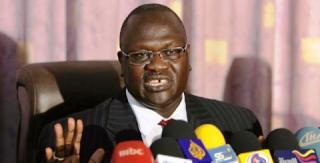Machar congratulates S. Sudanese on Martyrs Day, decries dictatorship
July 31, 2013 (JUBA) – South Sudan’s former vice-president, Riek Machar, on Tuesday congratulated the country’s citizens for honouring millions of people who lost their lives during the liberation struggle in pursuit for independence.

He said many leaders, including SPLM founder, John Garang de Mabior, members of gallant forces and ordinary citizens died in the over two-decade-long civil war with Sudan. The late Garang, the first leader of the movement died on 30 July 2005 in a helicopter crash as he returned to South Sudan from Uganda.
Machar, who addressed local and international media after his removal as vice-president last week, further urged the people to remain calm and commemorate the day in harmony and unity.
In a series of decrees issued on 23 July, South Sudan president Salva Kiir relieved Machar from the vice-presidency and dissolved the entire government in a move that shocked many.
However, Machar has since appealed for calm, calling for the need to establish a national corporation responsible for raising funds, as well as organising and preserving such national events for generations to come.
MOVING TOWARDS DICTATORSHIP
Machar has advised president Kiir, who is also the SPLM chairman, against resorting to dictatorship, urging him to respect the democratic principles enshrined in the country’s transitional constitution, as well as in the party’s constitution.
He insists he tried to correct issues within the government during his last eight years of service, but to no avail, adding that the situation had left him with little option but to speak out publicly against such challenges, including rampant corruption, rising tribalism, insecurity, stagnant economy, poor international relations and a loss of vision and direction by the ruling party.
In a 5 May politburo meeting, Machar enumerated the shortcomings and informed his SPLM colleagues that he intended to run for the party chairmanship this year and in the 2015 presidential elections – a revelation which raised eyebrows and subsequently cost him his job.
However, he maintains that self-criticisms within a party leadership are healthy in democratic processes and that it was equally his constitutional right to contest for any political position in the country.
He criticised Kiir’s sacking of the elected governors of Lakes and Unity states, saying it was in violation of the constitution, arguing that the president had no constitutional right to sack elected governors at will.
According to Machar, the two states had not experienced situations that threatened national security or territorial integrity.
He said the only state in South Sudan currently experiencing heavy conflict was Jonglei, due to deadly inter-communal fighting and clashes between the South Sudanese army (SPLA) and David Yau Yau-led rebel forces.
The former vice-president recognised the president’s constitutional powers to dissolve and form a new government, but stressed that Kiir should have done this at the time when he wrote a letter to 75 senior government officials suspected of stealing $4.2 billion.
RESOLVE MISUNDERSTANDINGS IN THE PARTY
Meanwhile, Machar urged the president, in his capacity as the chairman of the SPLM, to call for a political bureau meeting in order to resolve challenges arising in the party leadership.
He said the party appears to have been paralysed, with the process to pass its basic documents, such as the constitution, manifesto, rules and regulations and code of conduct, all coming to a standstill.
The SPLM was meant to hold its
The SPLM’s regular national convention, due to be held in May, in accordance with its five-year schedule, so as to elect a new leader as its flag bearer for the 2015 presidential elections, has also been delayed.
The last national convention during which members elected the current chairperson took place in May 2008.
Machar also criticised the recent move by Kiir, in which he issued two party orders suspending and silencing the SPLM secretary-general Pagan Amum.
Kiir has called for an investigation into Amum’s conduct, also banning him from travelling abroad and speaking publicly during the probe.
Machar claims some of the charges and disciplinary measures against Amum could have been addressed through the party’s institutions, while others can be done by government.
He warned against curtailing constitutional rights and freedoms of individuals, particularly freedoms of movement and expression.
The former vice-president further told the press that he had helped Kiir get elected when he campaigned alongside the latter in the country’s nine states during the 2010 elections. According to Machar, he first introduced Kiir to voters in Lakes state as his running mate, hoping that the South Sudan leader would accord him the same when he ended his 10-year stay at the helm come 2015.
“The president has reneged on the gentlemen agreement we had during the elections as running mates”, he added.
Machar also decried the president’s “one-man show” and his lack of attaching importance to the ruling party, saying he should have consulted with the politburo – the highest political organ of the party – on the formation of the next cabinet.
Machar has reiterated his intention to unseat Kiir in both the ruling party leadership and in the government’s top seat by 2015.
An analyst said the next battle ground is clearly drawn in the party, adding that unlike the government where Kiir has clear-cut constitutional powers to sack any one at will, he does have the same rights within the party to dismiss senior officials elected by the SPLM national liberation council.
“Besides, it seems Kiir will have light weight and less influence in the politburo or the institution may split as Machar seems to have gained more ground than Kiir in the most powerful party institution,” he said.
(ST)
